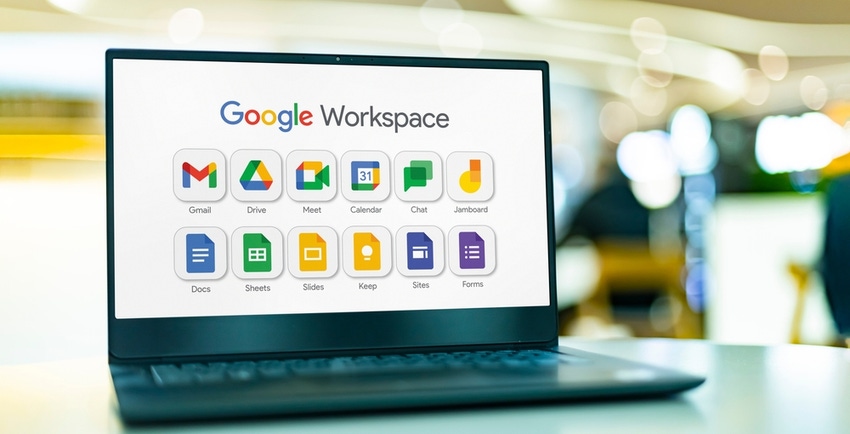Google Workspace Partners to Get Smaller Share of Profit Pie
Leading industry experts explain why Google might have made the move and what partners can do.

With partners looking for a larger share of the margin pie, Google Workspace this week said it will slash margins for Google Workspace partners at the time of contract renewal from 20% to 12%.
But the proclamation from the cloud giant isn't that surprising to some.
Anurag Agrawal, founder and chief global analyst at Techaisle, shared that he believes Google is doing the right thing.
"Google Cloud Platform is making a strategic move to empower partners in the AI revolution," said Agrawal. "They have significantly increased incentives for acquiring new customers, especially those interested in Gemini-powered Workspace solutions."

Techaisle's Anurag Agrawal
This aligns with current partner trends, the analyst told Channel Futures. Techaisle data reveals that nearly one-half (49%) of partners have prioritized growth, and 41% "are targeting AI offerings in 2024."
Furthermore, he noted, Google Cloud's incentive program is "a smart play, as channel partners who lag in adopting AI solutions risk falling behind evolving customer demands."
“We’re growing our rewards for partners overall to help them address the significant opportunity to deliver high-value services in areas like generative AI, cloud migrations, and data analytics, and Google Workspace," a Google spokesperson told Channel Futures.
Google Workspace Margins Still 'Very Healthy'
A source familiar with Google Cloud's inner workings told us that the change in Google Cloud's discount for Workspace renewals brings it more in line with industry standards and still provides partners with a "very healthy margin," particularly when stacked with additional customer discounts that are typically available.
They further said that Google Cloud is "redirecting its resources toward the biggest areas of opportunity for partners, including winning and expanding new Google Workspace accounts, expanding consumption of its infrastructure, and selling its AI tools."
Shifting a focus toward what our source said the company views as "the most lucrative opportunity they've ever seen for partners," AI "is part of the motivation for the company to redirect partner resources toward selling and helping customers implement AI, including in Google Workspace," something Agrawal echoed.
Sources close to the matter also said this shift is part of what Google Cloud views as a "multiyear effort to encourage partners to deliver more valuable and profitable services for customers," who they say increasingly are asking for more "highly skilled partners with deep knowledge in areas like AI and data management."
A Surprise for Some
Irwin Lazar, president and principal analyst at research firm Metrigy, told Channel Futures he is surprised to hear about the move that will impact Google Workspace partners.

Metrigy's Irwin Lazar
"We see Google Workplace in about 15% or so of companies that participate in our research, and they continue to improve products and features across the board as they continue to battle Microsoft for in the office suite market, as well as the voice/meetings/chat space," said Lazar.
He reasons it seems "odd" that the company would reduce partner compensation for renewals, noting that the move could cause Google Workspace partners to seek alternative providers such as Zoho and Zoom.
'Fast and Loose With Pricing'
Giving partners a 30-day notice, Dan Miller, lead analyst and founder of Opus Research, told Channel Futures, "Google has always been very fast-and-loose on pricing.
"Things they offered for free would take on a hefty price tag when companies started using them," added Miller. "And they were willing to start with a low-ball price to steal the march from Microsoft.
The margin cut also might be inspired by Microsoft's recent modifications to its Teams offering. As Channel Futures reported earlier this week, the software giant unbundled the offer from Microsoft 365 globally based on a European Union ruling that said it could no longer include Teams with Microsoft 365 for free. It now charges a list price of $5.25 for the workplace collaboration tool.
Are Some Google Workspace Partners Heading to Microsoft?
Operating on the premise of a traditional agent model, Viirtue CEO Dan Rosenrauch said Google Workspace partners don't have much control over pricing. In addition, he said, they have "a lack of ownership over the customer."
The downward move may have some Google Workspace partners eyeing an exit strategy toward the Microsoft Teams train.
That's 320 million monthly active users, Rosenrauch told readers.
"I think the powerful thing about Microsoft is it's a foot in the door for most MSPs. I'd always hope suppliers are doing the best they can regarding partner enablement, but Microsoft has a different value in that way," Rosenrauch asserted.
Rosenrauch further argues that white-labeling solutions should be the way to go, as the model gives partners more control over customers and higher profit margins.
Partners 'Need to Own the Customer Relationship'
"If a partner owns the customer relationship, a vendor can't come in and cut margins," Rosenrauch said.
With the lack of autonomy in this model, Rosenrauch makes the case for white-labeling solutions, which made it straightforward for Viirtue to cut Google Workspace partner profit margins.
In what we know to be a highly competitive space, skimping on commissions is something Rosenrauch says Google has to do at this point.
"The agent model backs people into a corner," he said, asking, "What are they to do? They have no recourse."
Rosenrauch said he sees some partners subscribing to the agent model, while others want to get technical and get their hands dirty.
"We are talking about millennials who want to manage that customer relationship, so I see it as increasingly difficult to compete," he said.
He believes partners shouldn't restrict themselves to a single model as this may very well lead to what we've witnessed with Google Workspace partners.
About the Author(s)
You May Also Like


